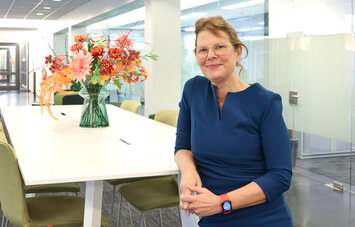“Quite an honor. But I also immediately saw its importance. At MindLabs, the entire range of education is represented, i.e., wo, hbo and (v)mbo. This is really about cooperation. That is of great importance, socially speaking. It is far from always recognized that we all have an important role to play in society, and cannot do without each other. It may be looked at with more equality in value and appreciation. It is great that all four directors of MindLabs underline this. That I am now the chair from the mbo branch reinforces this message.”
The role of the board
Because she also focuses on educational innovation within OGT, the two directorships coincide nicely. Liz clarifies exactly what the role of the board is: “Director Petra van Dijk, runs the day-to-day operations. As a board, we support her, but more at a distance. Because besides being a financial partner, we also feel organizationally responsible to ensure the success of the ecosystem. So we switch with Petra a lot, think about dilemmas and look ahead with her for policy and direction. From the three forms of education, we provide her with relevant information. Together we meld this into the right steps for MindLabs, aimed at continuity and further development.”
“It's really grabbing around like a virus.”
Although a two-month period may still be a bit short to already form a complete picture of the goings-on within the association, Liz talks enthusiastically about her first impression. For in a short time, it has become clear to her what it does when you bring together people from across the education chain, all focused on the basic theme of human centered AI. Liz: “The energy splashes off. When you sit together in the same building to learn and innovate and all focus on the same theme, valuable collaborations almost naturally emerge. That is beautiful to see.”
She refers to the openness of the MindLabs building: “The innovation center offers enough space to sit and work quietly. But it also has many open spaces and at the same time is small enough to facilitate spontaneous meetings. Here everyone works and talks to each other: students, teachers, professors, lecturers and practitioners. The ideal cross-pollination. Especially since you don't meet each other so easily otherwise. Learning, developing and innovating together is inspiring. And very contagious. There are many government agencies, companies and educational institutions that also want to join. It really is spreading like a virus; a good success indicator. The way in which the municipality of Tilburg participates in this also shows entrepreneurship and innovation. At MindLabs, we are really working together on the future of the city and the region.”
Cooperation education essential for society and future
When asked why it is so important to collaborate from across the education chain, Liz answers resolutely, “The degree of applicability is greatly enhanced. A lot can be solved with AI and robotization, but not everything. Seeing with subject matter expertise and practical experience where technology can provide a really meaningful new solution cannot be automated.”
She substantiates, “It is often the case that good ideas for using technology are conceived at the wo level. But usually still abstract and very generic. Pure brainpower. While it is precisely at the specialist level, from the field, that input is needed. Using each other's knowledge, taking everyone's requirements, thoughts and experiences and bringing everything together. That strengthens. The quality of applicability then increases enormously.”
Future plans MindLabs
From her fresh perspective, are there any ideas or plans for the future of MindLabs? “I look primarily from movement. When I see what is now standing in terms of beautiful collaborations and projects, I can only conclude that my predecessor Fred van der Westerlaken did a fantastic job. I want to build on this and guide the ecosystem into the next phase. So that we grow into an organization that is systematic and can be further developed. It is important that we keep innovating continuously.”
In doing so, Liz also strives to deepen: “It is good to see how we can intensify the collaborations within the chain on many themes. That way we allow what we learn here to permeate the entire educational practice. So whereby it is not limited to the people connected to MindLabs, but we let everyone benefit. That means making our collaborations even more robust.”
Ethics increasingly important
Finally, Liz expects more to come to MindLabs on the moral front as well. “Because the technical possibilities with AI sometimes seem limitless, the issue of acting ethically becomes more and more important. We will have to have more conversation with each other to keep discussing dilemmas. And make more choices in what to develop and what not to develop. Even if it is possible, do we want it? Guaranteeing that human scale is an important issue for the future.”
“Tricky though,” Liz emphasizes, “there may not be answers yet, but it is important to keep talking about this. This also reaffirms the importance of us as an incubator where these kinds of dilemmas surface. Where people are collectively working on these issues and the importance of acting ethically is recognized.
“An exciting playing field!” concludes Liz. “I look forward to what is all to come.”

